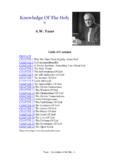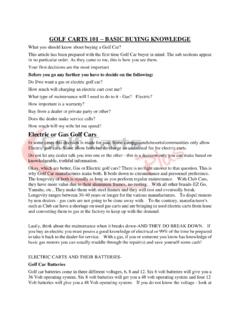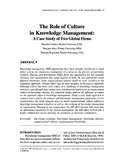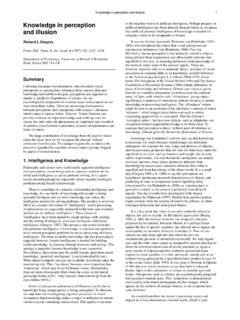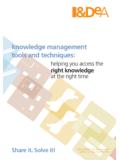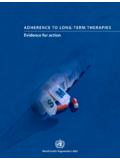Transcription of FOUR KINDS OF KNOWLEDGE - Acts of Being
1 four KINDS OF KNOWLEDGEREVEALED KNOWLEDGESPECULATIVE KNOWLEDGESCIENTIFIC EMPIRICAL KNOWLEDGEPRACTICAL EMPIRICAL KNOWLEDGELoyd L. Fueston, 2008, Loyd L. Fueston, the original version of this work as published on the website, , I reserved commercial rights, intending to allow personal use and copy of this the interests of clarity, I m switching to a Creative Commons license as reserved according to Version of the Attribution-Noncommercial-No DerivativeWorks license as written and published by Creative Commons Corporation. This licensecan be found A copy isalso appended to the end of this book.[T]he first philosophy[metaphysics] utilizes theteachings of all the sciences inorder to realize its Thomas Aquinas in Chapter4 ofSumma Contra Gentiles,Book Two: Creation, U. ofNotre Dame Press, 1975,Translated by James , page 35 ContentsContentsiPreface to Third EditioniiiPreface to Second EditionvPrefaceviiIntroductionxiBiblical Quotations.
2 Xiv1 Preliminary Epistemological Issues12 Revealed Introduction .. How Can We Hear God? .. Can Revelation Be Kept Pure? .. 343 Speculative Where Went Our Humility .. What Then is Speculative KNOWLEDGE ? .. 45 Biological Evolution and Moral Nature .. 46 The Big Bang and the Primordial Universe .. 494 Scientific Empirical Overview .. Verifiable Sciences and Historical Sciences .. The Empirical Nature of All KNOWLEDGE .. Can We Keep Empirical KNOWLEDGE Clean of Speculation? . A Fresh Start .. 635 Practical Overview .. The Morality of Doing .. 706 Confusing Realms of Human Overview .. Absolutizing the Provisional .. Confusion Reigns .. 787 Some Moral Aspects of Summary of My Position So Far .. Authority and Claims to Authority .. The Development of Human KNOWLEDGE .. 82 Preface to Third EditionThis new edition contains only minor changes to the Preface.
3 I eliminatedreferences to books I d been planning on writing back in 2010 and didn reader might be interested in some small progress I ve made in thetask of understanding Being by way of understanding complex entities suchas communal human Being . If you are so interested, you can freely downloadThe Shape of , this is a book I did to Second EditionThis new edition contains only minor changes though I hope that I vecleaned up a few small problems and also made some sections more perhaps a violation of standards, I have revised the some interval of time, reaching a climax in the middle of 2005, I cameto believe, in my heart of hearts, that God is the source of all truths, eventhe most basic of logical or arithmetic truths. And I came to see that as partof the Christian message. It s not that I advocate a form of irrationalism,a belief that God can do what is logically impossible. I advocate a form ofreason which is a result of the all-powerful God s decision to bring into beinga particular Creation in which specific truths are manifested and even serveas the basic stuff of all created Being .
4 I advocate a form of reason whichreflects our particular creaturely natures and, mostly, the specific CreationGod freely brought into existence. Yet, most who think of themselves asChristians talk and act as if there is some body of fundamental truths,composing mathematics and metaphysics, that is independent of God sothat it can be used as one example to prove that God ultimate question is:Does God think thoughts regulated by some body of absoluteand abstract truths which are logically prior to Him?Most people, even the most devout of Christians, talk and think and actas if the answer is Yes, even God has to accept the basic axioms of logicand mathematics. Against this sort of view, I am proposing that what wesee as abstract truths are thing-like and fact-like, particular aspects of aspecific a very preliminary way, I addressed this problem in an earlier book,ToSee a World in a Grain of Sand, which provides some background analysiswhich might make it easier to understand this book.
5 In that book whichI will refer to asWorld, I did little more than state that Christians believeGod to be the source of all truths. He is the source of the revelation that Heexists and also the source of the revelation that He is Father, Son, and HolyviiviiiPREFACES pirit in one God. I claim also that the Almighty is the source of the truthsof metaphysics and mathematics. I am ready to move a little past thattentative position, moving towards a view that Creation and its things andits abstract truths exist, came to be, were objectified, just because Creationis an object of God s love. I move a little bit closer to that more radicalposition in some preliminary discussions of the debate between Niels Bohrand Albert Einstein on the nature of physical reality. The interested readercould also read two blog articles: A Christian View of Einstein s and Bohr s Debate on Reality, ; and Quantum Mechanics and Moral Formation: Part 1, found this book, I do not address questions such as:Could God have created a world in which it is not true that 1 + 1 = 2 or a thing can be and not be at the same time ?
6 It currently seems to me to be no more than nonsense to ask if we,creatures that we are, have any truths independent of God. Perhaps thesesimple truths could not be otherwise, but that is no matter since they stillcome to us from God in His free-chosen role as Creator. It s hard to imaginethat a creature, made of what does not exist, could have direct access toany truths but those embedded in Creation, where Creation does includewhat I called the Primordial Universe inWorld. The Primordial Universeis the manifestation of those truths God chose as the underlying stuff ofour physical universe and of the universe of the resurrected. As God usesthat stuff to tell a story centered around His incarnate Son, those universesbecome moral narratives of the strongest sort St. Thomas Aquinas knew: things are true. Things are true justbecause they are manifestations of thoughts of God. I m going further toclaim that truths are thing-like, concrete in that they come to us, creatures,as aspects of created things, but more so in that they also are thoughtsof God though they seem to be manifest in a different way than heliumatoms or Mount St.
7 Helens. Then again, it might be that Aquinas didsay this and a fresh reading of his massive output might allow some brighthistorian of thought to prove he preceded me in this seemingly ridiculousixclaim. In any case, truths are also thoughts of God and this should beclear even to those who think certain truths, say those of mathematics, tobe abstract and absolute so that they are beyond even God s reach. ButChristians cannot think in such terms since we believe in a God who createsfrom nothing. If there is nothing, there is not only no things but also nomanifested abstract truths of even a metaphysical or mathematical , the mathematical truth 1 + 1 = 2 is concrete in the same wayas the physical fact A hydrogen atom has one proton and no neutrons .Without individual things, there would be no hydrogen atoms and withouta Primordial Universe, there would be no metaphysical truths, from whichmore particular forms of created Being could be shaped.
8 In that case, therewould also be no there were no Creation at all, only God would exist and God is con-crete in a way beyond any created , so, I m setting out on an extended effort to explore various aspectsof these truths which come from the self-revelations of the God of JesusChrist. I admit to feeling more than a bit disoriented, Being a modernman used to the idea that there are realms of truths, mathematical andmetaphysical, which come to man directly and are independent of eventhe Almighty Himself. Moreover, I m disoriented by my own claim thatrealms of KNOWLEDGE , mathematical and metaphysical and theological andempirical, don t correspond to realms of reality but only to ways in which afinite human mind evolves and develops as communities and as is true of various books I m writing during the sixth decade of my life, Iam using my first published book,To See a World in a Grain of Sand, asa foundation and reference point.
9 As is also true of many of those variousbooks, some of them even Being novels, this book is part of an exercisein the raising of a Catholic Christian worldview. This means that thisworldview will be deeply and explicitly Trinitarian and Christological who wish to know the underlying assumptions of this worldviewcan do no better than to read theProfession of Faithfrom a Catholic came from the Council of Nicaea and was somewhatmodified in later years. TheProfession of Faithanswered various questionsraised by the orthodox faithful or the heretical faithful or the nonbeliev-ers1about God and about the incarnate Son of God, using the Bible andthe traditional liturgy and other Apostolic traditions as the sources of reader should beware that I will be arguing and writing in moreconventional styles than I did inWorld, but I am still engaged in an effort todeconstruct modern thought which I consider to be burdened with so manyerrors introduced by various thinkers who had strayed from Christianity aswell as many errors which have developed as Christian thinkers have tried tohold on to speculative thought and provisional understandings of empiricalreality which are no longer valid.
10 That s a mouthful, but it comes down tothis:1I admit to an admiration for some heretics, perhaps many if I knew more history ofChristian thought. I also have little or no confidence in the ability of church functionariesto recognize the truth or to distinguish between a heretic or a thinker such as Galileowho was probably more orthodox in his beliefs than were those who opposed him. Inshort, I use heretical in a morally neutral sense. A similar comment would express myattitude towards many nonbelievers, even some outright very language is deformed so that it is very hard tospeak the truth. Our Lord, Jesus Christ, often spoke by way ofparables and poetry. Seemingly garbled syntax will sometimespoint towards the truth where straight talk will point towardslies no matter how you can struggle to speak clearly. That seem-ingly garbled syntax might well be the orderly ways of speakingfor future might be able to write straight with crooked lines, but we shouldn tassume we can.
